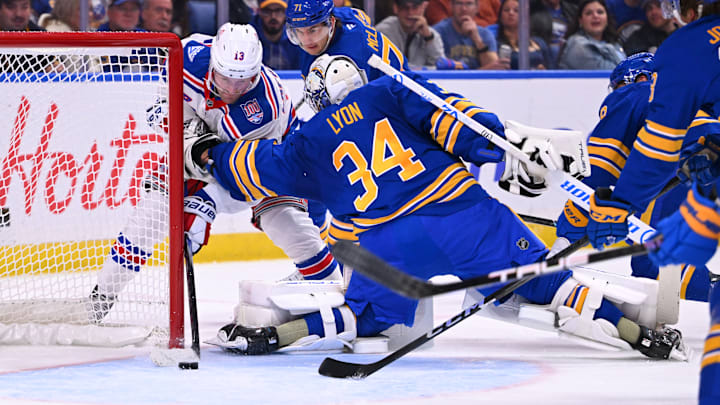It's not just one game. It's 14 years. Fourteen years of believing unacceptable stretches of uninspired hockey is normal, which leads to results like last season's 13-game losing streak that destroyed the Buffalo Sabres season after less than three months.
The Sabres desperately need a new mentality. One where a loss, even a 4-0 defeat to a strong New York Rangers club on the first night of an 82-game schedule, is never shrugged off. One where there's true accountability in the locker room for game-changing mistakes.
Quotes like one from Rasmus Dahlin, Buffalo's fiercest competitor and the team's best player on the ice Thursday night, aren't the type of outlook the Sabres need this season.
"We have 81 left, guys," Dahlin told reporters. "We just have to keep growing. We have something really good going on here. If we just got one, the game would have looked way different. It's unfortunate. We learn from it and grow."
You could change the name with the same quote and it already sounds like every other season from the franchise's NHL-record playoff drought. The mindset needs to change. Fast.
The Buffalo Sabres must embrace a more urgent approach to building a winning culture before another season slips away
It's easy to push aside any single result during a seven-month regular season. One-game sample sizes never lead to definitive conclusions. For a team like the Sabres, however, it's dangerous to sit back and think the status quo is good enough. It's not.
Making excuses for Buffalo is easy after Opening Night. Five members of their projected lineup — Zach Benson, Jordan Greenway, Owen Power, Michael Kesselring and Ukko-Pekka Luukkonen — missed the game because of injury and another key contributor, Josh Norris, left the contest early.
The Sabres also faced one of the best goalies on the planet, the Rangers' Igor Shesterkin, on a night where he was tracking the puck impeccably. The 2022 Vezina Trophy winner stopped all 37 shots, though he didn't face a ton of high-danger chances.
So yes, it's easy to sit back point at those factors and move on without giving the loss another thought, but that's the cycle the Blue and Gold need to break. Every game is important, particularly when a one- or two-point difference could alter their playoff hopes.
Head coach Lindy Ruff seems to have a better grip on that reality. His postgame comments were a lot more detail oriented.
"We were chasing the puck around," Ruff said. "I think at one point we were at less than 20 percent on faceoffs, so they had the puck all the time, which hurt us. They've got a couple guys that are good in the faceoff dot. We didn't win the faceoffs clean, and we didn't get the secondary help."
He added: "We weren't puck sharp."
Along with continued struggles on faceoffs, the power play, which has held the Sabres' offense back significantly the past two years, once again failed to deliver meaningful pressure en route to an 0-for-4 performance. Buffalo also lost the battle in blocked shots, 16-13.
These are problems that pop up annually for the Sabres. Areas of the game that prevent the organization from turning a corner in the never-ending rebuild process.
Yes, on the surface it's "just one game," but in the bigger picture it was representative of so many Buffalo losses over the past 14 playoff-less seasons. That's why treating it like just another game is so risky. It puts the team in position to fall back into it's old, unsuccessful habits already.
The Sabres must find a way to avoid falling in that trap. The best solution is taking more pressing approach to to each game and its aftermath. A relentless pursuit to fix these longstanding issues.
We'll see if a more efficient version of the Blue and Gold shows up Saturday night when they visit TD Garden to take on the Atlantic Division rival Boston Bruins.
